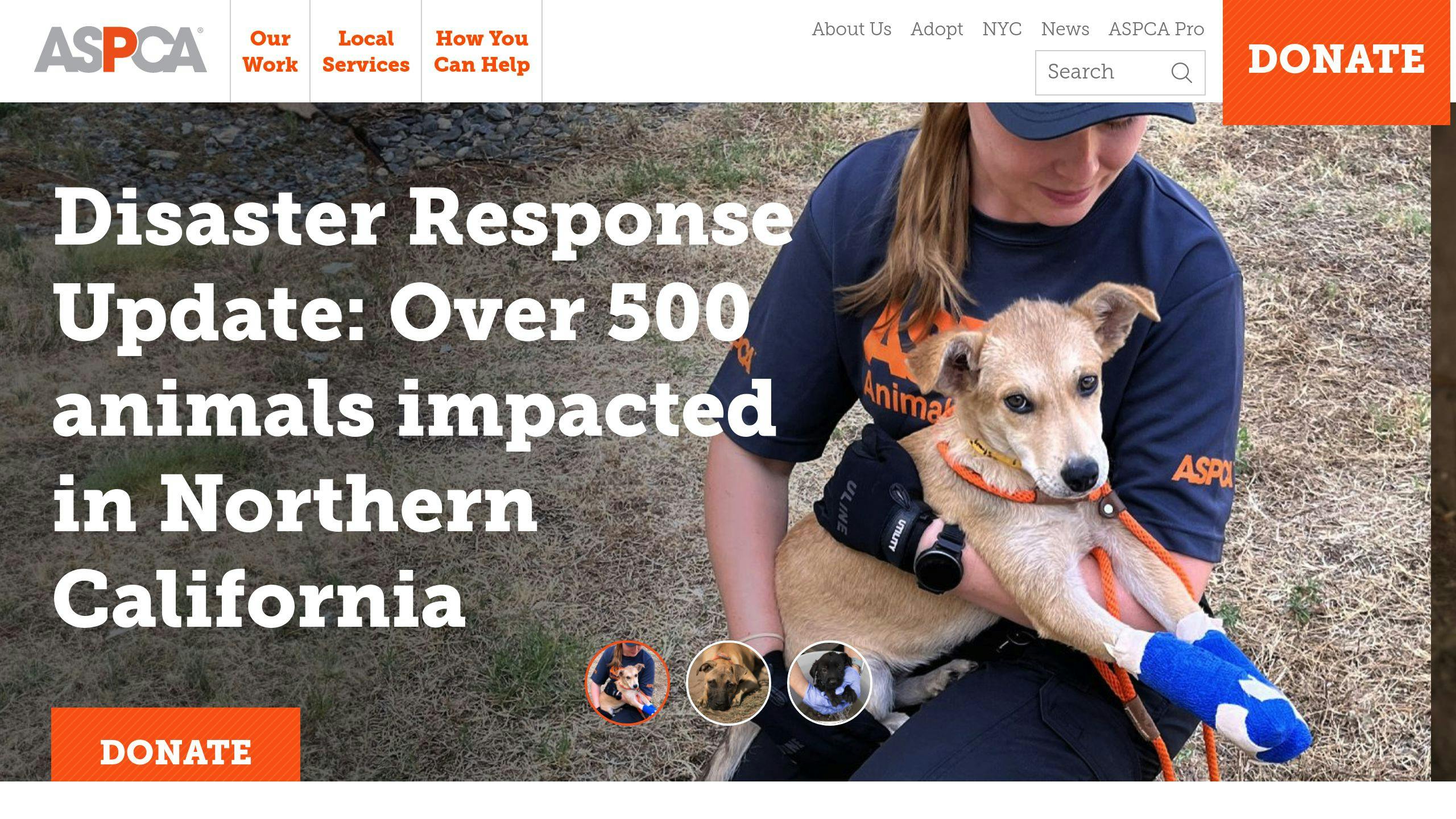Losing a pet can be as devastating as losing a family member. Pet loss support hotlines offer crucial help during this difficult time:
- 24/7 emotional support from trained professionals
- Confidential, judgment-free space to express grief
- Coping strategies and resources for healing
- Connections to local support groups and counselors
Popular hotlines include:
- ASPCA: (877) GRIEF-10 - Available 24/7
- PetCloud: 833-PET-1234 - Open daily
- Tufts University: (508) 839-7966 - Weekday evenings
| Hotline | Hours | Special Features |
|---|---|---|
| ASPCA | 24/7 | Email support available |
| PetCloud | Daily 9am-9pm PT | Nationwide coverage |
| Tufts University | M-F 6-9pm ET | Staffed by vet students |
These services provide immediate support to help pet owners process grief, honor their pet's memory, and begin healing. Seeking help is a healthy step in coping with the loss of a beloved animal companion.
Related video from YouTube
What Are Pet Loss Support Hotlines?
Pet loss support hotlines are phone services that help people deal with the sadness of losing a pet. They offer a kind ear and advice during this tough time.
Purpose of Support Hotlines
These hotlines aim to:
- Show that feeling sad about a pet's death is normal
- Give people a safe place to talk about their feelings
- Share ways to cope with grief
- Help find more support if needed
How These Hotlines Work
Here's how pet loss support hotlines usually work:
- People call a special phone number
- Trained helpers answer the calls
- Callers can talk about their pet and how they feel
- The helpers listen and offer support
Some hotlines are open all day, every day. For example, the PetCloud hotline (833-PET-1234) is open:
- Monday to Friday: 9 a.m. to 9 p.m. PST
- Weekends: 12 p.m. to 8 p.m. PST
Types of Help Offered
Pet loss hotlines offer different kinds of help:
| Help Type | What They Do |
|---|---|
| Listening | Let people share their feelings |
| Advice | Give tips on how to deal with loss |
| Finding Help | Tell callers about local support groups |
| Information | Explain ways to remember pets |
| Emergency Help | Help people who are very upset |
Some hotlines, like the Cornell University Pet Loss Support Hotline (607-218-7457), have vet students as helpers. These students learn from grief experts to give good support for pet loss.
Advantages of Using Support Hotlines
24/7 Support Access
Many pet loss support hotlines offer help around the clock. For example, PetCloud (833-PET-1234) is open:
- Weekdays: 9 a.m. to 9 p.m. PST
- Weekends: 12 p.m. to 8 p.m. PST
This means pet owners can get help when they need it, no matter where they live or what their schedule is like.
Privacy and Confidentiality
Support hotlines keep calls private. This lets pet owners talk freely about their feelings without worry. The Blue Cross Pet Bereavement Support Service, for instance, makes sure all calls stay confidential.
Expert Advice and Information
Hotlines often have trained helpers who know a lot about pet loss. For example:
- Cornell University's hotline has vet students trained in helping with grief
- The Blue Cross has team members who are good at comforting people
These helpers can give tips on how to cope and share useful information.
Connecting with Others
Support hotlines can help pet owners find more ways to get help. They often tell callers about:
- Local support groups
- Pet loss counselors
- Online groups where people share their stories
This helps pet owners feel less alone and talk to others who understand what they're going through.
| Advantage | How It Helps |
|---|---|
| Always Open | Get help any time |
| Private Calls | Talk freely without worry |
| Trained Helpers | Get good advice and info |
| Find More Support | Connect with others who understand |
Choosing a Pet Loss Support Hotline
Finding Available Options
Here are some ways to find pet loss support hotlines:
- Look for state hotlines: Many states have their own pet loss support services.
- Check university services: Some vet schools offer pet loss hotlines.
- Try national groups: Organizations like ASPCA have hotlines across the country.
- Look outside the US: Other countries may have their own pet loss support services.
What to Look For
When picking a pet loss support hotline, think about:
| Factor | Description |
|---|---|
| Hours | When the hotline is open |
| Staff | Who answers the calls |
| Help types | What kind of support they give |
| Price | If it's free or costs money |
| Focus | If they help with specific issues |
Checking Reliability
To make sure a hotline is good:
- Check who runs it: Is it a vet school or well-known group?
- Look for reviews: See what other people say about it.
- Try calling: See how fast they answer and if they're helpful.
- Ask about privacy: Make sure they keep your call private.
- See what else they offer: Do they have other ways to help?
| Aspect | What It Means |
|---|---|
| Who runs it | Is it a trusted group? |
| Reviews | What do others say? |
| How they answer | Are they quick and helpful? |
| Privacy | Do they keep calls secret? |
| Other help | Do they offer more than just calls? |
Popular Pet Loss Support Hotlines
ASPCA Hotline

The ASPCA Pet Loss Support Hotline helps pet owners who are sad about losing their pets. You can call them at (877) GRIEF-10 or (877) 474-3310 any time, day or night. The people who answer the calls are trained to:
- Listen to your feelings
- Give you tips to help with sadness
- Keep your call private
If you'd rather write, you can email them at griefsupport@aspca.org.
Pet Loss and Bereavement Association
The Association for Pet Loss and Bereavement (APLB) helps people who have lost pets. They don't have a phone hotline, but their website has:
- People you can talk to about losing your pet
- Online cards to remember your pet
- A list where you can add your pet's name
- Help with legal issues about pets
- Special help for people who've lost service animals
You can also talk to other people who have lost pets on their website.
Tufts University Hotline

Tufts University's vet school has a pet loss hotline at (508) 839-7966. You can call:
- Monday to Friday
- From 6-9 PM Eastern Time
They'll call you back for free if you're not in Massachusetts. The people who answer know a lot about helping with pet loss.
Other Helpful Hotlines
Here are more places you can call for help:
| Who to Call | Phone Number | When to Call | What's Special |
|---|---|---|---|
| Chicago Veterinary Medical Association | (630) 325-1600 | Call to check | For Chicago area |
| Virginia-Maryland Regional College of Veterinary Medicine | (540) 231-8038 | Tues & Thurs 6-9 PM ET | For Virginia and Maryland |
| PetCloud | 833-PET-1234 | M-F 9am-9pm PST, S-S 12pm-8pm PST | For all of USA |
| Monmouth County SPCA | (732) 542-0040 | M-F 9am-5pm | They'll call you back for free |
| Cornell University | (607) 253-3932 | Tues & Thurs 6-9 PM ET | They'll call you back |
These hotlines can help you right away or for a longer time. Many have people who know how much pets mean to us. When picking a hotline, think about:
- When they're open
- If they help people in your area
- What kind of help you need
Your First Call to a Support Hotline
Starting the Conversation
When you call a pet loss hotline, a trained helper will answer. They understand how hard it is to lose a pet. You can say anything you feel without worry. To start, you could say, "I lost my pet and I'm having a hard time."
Questions You Might Hear
The helper may ask you some questions to understand how to help you best:
| Question | Why They Ask |
|---|---|
| Can you tell me about your pet? | To know what your pet meant to you |
| When did you lose your pet? | To understand how fresh the loss is |
| How are you feeling now? | To gauge your current emotional state |
| What's been hardest for you? | To identify specific areas where you need support |
Remember, you only need to share what you're comfortable with.
Coping Tips You'll Receive
The helper will give you ideas to help you feel better:
- It's okay to feel sad
- Talk to friends or family about your pet
- Find ways to remember your pet
- Take care of yourself during this time
- Help children who miss the pet too
They'll remind you that everyone grieves differently and it takes time to heal.
Extra Help After the Call
After you talk, you can get more help:
| Type of Help | What It Is |
|---|---|
| More calls | You can call again if you need to |
| Support groups | Find people near you who also lost pets |
| Reading material | Books and websites about pet loss |
| Professional help | When to see a counselor if you're still struggling |
These extras can help you keep working through your feelings after the call ends.
sbb-itb-c538f2f
Other Ways to Get Support
Online Groups and Forums
Online groups and forums let pet owners talk to others who have lost pets. These online places are good for:
- Sharing stories
- Talking about feelings
- Learning how to cope
Some popular online groups are:
- APLB forums
- Petloss.com boards and chat rooms
- Rainbows Bridge Grief Support Center
- House Rabbit Society's Pet Loss Support page
These are open all the time, so you can get help whenever you need it.
Pet Loss Counseling
Talking to a counselor who knows about pet loss can help. These counselors can:
| What They Do | How It Helps |
|---|---|
| Talk one-on-one | Help with your specific situation |
| Teach coping skills | Show you how to handle sad feelings |
| Explain grief | Help you understand why you feel sad |
| Give long-term help | Keep helping you as time goes on |
Some good counselors to call are Deborah Antinori, Julie Corbin, or Susan Dowd Stone.
Books About Pet Grief
Reading books about losing pets can help you feel better. Some good books are:
- "The Loss of a Pet" by Wallace Sife
- "When Your Pet Dies" by Alan D. Wolfelt
- "Goodbye, Friend" by Gary Kowalski
These books talk about feeling sad and how to feel better.
Ways to Remember Your Pet
Doing something to remember your pet can help you feel better. Here are some ideas:
- Make a photo book
- Write a letter to your pet
- Plant a tree for your pet
- Join an online candle lighting
- Get a picture or jewelry made of your pet
These things can help you keep good memories of your pet.
Taking Care of Yourself
Accepting Your Feelings
When you lose a pet, it's okay to feel sad. Dr. Kriss A. Kevorkian, Ph.D., MSW, says it's good to think of your pet as family and to be open about feeling sad. It's normal to feel very upset when a pet dies. Trying to hide how you feel can be bad for you.
Making a Pet Memorial
Making something to remember your pet can help you feel better. Here are some ways to do this:
| Memorial Idea | Description |
|---|---|
| Photo album | Put together pictures of your pet |
| Garden stone | Make a stone with your pet's name |
| Special urn | Get a nice container for your pet's ashes |
| Plant or garden spot | Grow a plant or set up a special area outside |
These things can help you keep good memories of your pet.
Keeping Up Daily Habits
It's important to take care of yourself when you're sad about your pet. Here are some things to do:
| Habit | Why It Helps |
|---|---|
| Eat good food | Keeps your body and mind healthy |
| Drink water | Helps you feel less tired and stressed |
| Get enough sleep | Helps you deal with feelings |
| Do light exercise | Makes you feel better |
| Do things you like | Takes your mind off being sad |
Doing these things can help you deal with losing your pet.
Talking to Friends and Family
Talking to people who care about you can help when you're sad about your pet. Tell your friends and family how you feel. They can listen and share memories of your pet with you.
If it's hard to talk to people you know, you can:
- Join a group for people who lost pets
- Talk to a counselor who knows about pet loss
These can give you a safe place to talk about how you feel.
When to Get More Help
Signs Grief Is Too Much
Sometimes, feeling sad about losing a pet can be too hard to handle alone. Here are some signs that you might need extra help:
| Warning Signs | What It Looks Like |
|---|---|
| Feeling very sad for a long time | Can't seem to feel better after weeks or months |
| Hard to do everyday things | Trouble going to work or taking care of yourself |
| Feeling very guilty or angry | Can't stop blaming yourself or others |
| Staying away from people | Not wanting to see friends or family |
| Body feels different | Can't sleep, eat too much or too little, feel sick |
If you notice these things for more than a few weeks, it might be time to talk to someone who can help.
Types of Help You Can Get
When you're too sad to feel better on your own, there are people who can help:
Special helpers who know a lot about losing pets can teach you ways to feel better.
You can join a group of people who also lost pets. In these groups, you can:
- Talk about how you feel
- Know it's okay to be sad
- Learn how others dealt with losing a pet
3. Online Help
You can talk to helpers on the computer or phone if you can't go see someone in person.
Finding Groups That Can Help
Here's how to find groups for people who lost pets:
| Where to Look | What You Might Find |
|---|---|
| Vet offices | They might know about groups nearby |
| Community places | Some have meetings for sad pet owners |
| On the internet | You can join groups online |
| Pet loss groups | Big groups like APLB have different ways to help |
When picking a group, think about:
- How often they meet (usually once or twice a month)
- How many people are in the group (often 8-10 people)
- If it's in person or online
- If it costs money (many are free or cheap)
Supporting Others Who Lost a Pet
When someone you know loses a pet, you can help them feel better. Here's how to support friends, family, and even vets who are sad about a pet's death.
Helping Friends and Family
To comfort a friend or family member who lost a pet:
- Say you're sorry for their loss
- Listen to them without judging
- Help with things like putting away pet items
- Talk about good times with the pet
- Keep checking on them over time
| Good Things to Do | Things to Avoid |
|---|---|
| Show you care | Say "it's just a pet" |
| Offer to help | Tell them to "get over it" |
| Listen well | Compare their loss to others |
| Let them grieve their way | Suggest getting a new pet right away |
| Share helpful info if they want | Make light of their feelings |
Helping Kids Cope
Kids may feel differently about losing a pet. Here's how to help them:
- Be honest about what happened
- Let them talk about how they feel
- Help them make something to remember the pet
- Keep their daily routine the same
- Suggest drawing or writing about the pet
Good books for kids about pet loss:
- "Dog Heaven" by Cynthia Ryland
- "Cat Heaven" by Cynthia Ryland
- "The Tenth Good Thing About Barney" by Judith Viorst
- "A Special Place for Charlee" by Debbie Morehead
- "When Friendship Lives Beyond the Stars" by Dr. Amy Sugar
Help for Veterinary Staff
Vets and their staff can feel sad when pets die too. Here's how to help them:
- Know that seeing pets die a lot can be hard
- Give them info about counseling or support groups
- Tell them to take care of themselves
- Make the workplace a good place to talk about feelings
- Teach them how to deal with being sad about pets dying
Wrap-Up
Losing a pet is hard. Pet loss support hotlines can help you during this sad time. These hotlines give you someone to talk to and advice on how to feel better.
It's okay to feel sad and ask for help. You can call a hotline, join a group, or do something to remember your pet. The most important thing is to let yourself feel sad and take time to get better.
Here are some tips to help you when you're sad about your pet:
- Feel how you want to feel. Don't let others tell you how to feel or when to stop being sad.
- Talk to other people who have lost pets. They understand how you feel.
- Make something to remember your pet, like a photo book.
- Take care of yourself. Eat well, sleep enough, and do things you like.
- Keep taking care of your other pets if you have any. They might be sad too.
| Ways to Remember Your Pet | How It Helps |
|---|---|
| Make a photo book | Keeps memories alive |
| Plant a tree or flower | Creates a living memorial |
| Make a donation | Helps other animals in need |
| Create a memory box | Stores special items |
| Write about your pet | Expresses your feelings |
FAQs
How to feel better after losing a pet?
Here are some steps to help you cope with pet loss:
| Step | Description |
|---|---|
| Accept your feelings | It's okay to be sad |
| Talk to others | Share with friends or join a support group |
| Make a pet memorial | Create something to remember your pet |
| Take care of yourself | Eat well, sleep enough, and exercise |
| Get help if needed | Talk to a counselor if you're still very sad |
How long will I feel sad about my pet?
There's no set time for feeling better after losing a pet:
- Everyone grieves differently
- Some people feel better in weeks or months
- Others may be sad for years
- Healing takes time and can't be rushed
- Focus on small steps forward, not a deadline
If you're still very sad after a long time, it's okay to ask for help from a counselor or support group.

